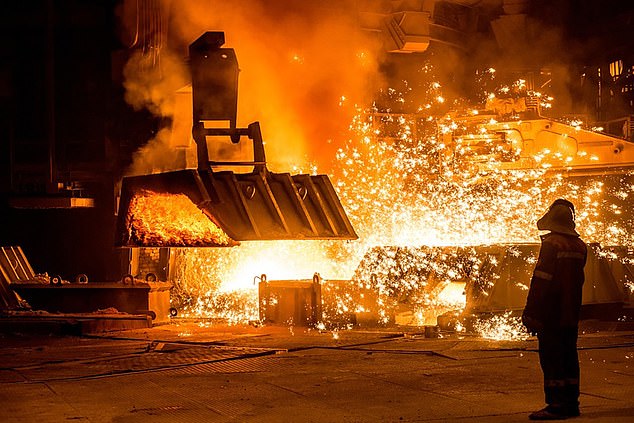Green taxes hobbling the steel industry may be scaled back after the Government’s rescue of Scunthorpe’s blast furnaces.
The Business Secretary told The Mail on Sunday climate change levies were under scrutiny after he was forced to seize control of British Steel from its Chinese owner Jingye last week.
Asked whether the Government was prepared to reconsider green levies, Jonathan Reynolds said: ‘Is it sensible to take money from one bit under state control and give it to another bit of Government? We’ll have to look at that and address that in the coming days.’
Reynolds said the levies, which are set to raise £9 billion in this parliament, had a legitimate aim – persuading firms to invest in ‘cleaner, more efficient technology’ but added: ‘Decarbonisation can’t be deindustrialisation.’
He said the UK sector did not have the ‘competitive platform’ it needed, adding: ‘It’s got to be better. That’s the basis of the industrial strategy I’ve been working on.’
Any move to scrap or reduce the climate change levy would be welcomed by senior industry figures.
Under the levy, firms are charged £18 per ton of carbon dioxide emissions, which is nearly four times higher than a decade ago.

Rethink: Green taxes hobbling the steel industry may be scaled back after the Government’s rescue of Scunthorpe’s blast furnaces
Sir Andrew Cook, one of the steel industry’s most respected figures as head of the country’s largest steel castings firm, William Cook, dubbed the levy ‘barmy’. He said it was ‘taxing a necessity’ and piling costs on UK producers that put them at a disadvantage to steelmakers in competing nations.
The industry, he said, ‘is one of a number of victims of a perverse ideology’ likening it to a ‘three-legged stool’. He said it would ‘fall over’ without blast furnaces to make virgin steel, with other measures to support UK production and curb unfair competition ‘almost exclusively from China’.
‘Without them, I don’t think you can ever put the industry on a long-term footing,’ he said.
To make steel greener, Sir Andrew called for the development of carbon capture technology – still in an experimental phase – instead of green taxes.
He said: ‘If Britain wants to lead in some green move, let’s apply carbon capture to these blast furnaces. It would be a perfect test bed.’
Sir Andrew believes the seeds of the steel industry crisis were sown by previous governments, saying: ‘It goes right back to George Osborne and David Cameron feting President Xi. It was staring anyone in the face who chose to look, that China was bent on securing the domination of world trade.’ He added that the situation was compounded by the Boris Johnson government allowing Jingye to take over British Steel in 2019, saying: ‘These were reckless decisions made oblivious to reality.’
Blast furnaces producing virgin steel are fuelled by coking coal, while electric arc furnaces are vulnerable to high power prices.
Electricity prices for ‘very large’ UK firms are 63 per cent higher than in the EU, according to most recent Government data for 2023.
‘If dumped steel is excluded from UK markets, the industry is potentially profitable. Some reduction in energy prices, which are controlled by Government, would be very helpful too,’ Sir Andrew said, adding of ArcelorMittal tycoon Lakshmi Mittal: ‘But you can make money from making steel. Mittal certainly knows how.
‘Do not regard spending British taxpayers’ money on UK steel products as a subsidy. It is simply a wise and fair purchasing policy, for the benefit of the taxpayer and the nation’s wider economy.’
Reynolds said: ‘That is a significant reason why a lot of British industry feels they are in a less competitive situation and something we’re really sensitive to.’
As well as developing electric arc furnaces at Scunthorpe to replace the blast furnaces, the Government has contributed £500 million to one of the world’s biggest electric arc furnaces, being built at Port Talbot, South Wales.
Lord Houchen, Conservative mayor of Tees Valley, backs a further electric arc furnace at the former Redcar works in the North-East. It closed in 2015 but retains an electricity connection and has a cleared site with planning permission for a new facility.
Reynolds said steel should not be seen as ‘some sort of sunset industry’, adding: ‘It’s not coal mining; it’s got this incredible demand and centrality to the economy.
‘Across most G7/G20 countries, the size of their steel sector domestically is broadly comparable to the size of their economies.
‘The only outlier is the UK.’
DIY INVESTING PLATFORMS

AJ Bell

AJ Bell
Easy investing and ready-made portfolios

Hargreaves Lansdown

Hargreaves Lansdown
Free fund dealing and investment ideas

interactive investor

interactive investor
Flat-fee investing from £4.99 per month

Saxo

Saxo
Get £200 back in trading fees
Trading 212
Trading 212
Free dealing and no account fee
Affiliate links: If you take out a product This is Money may earn a commission. These deals are chosen by our editorial team, as we think they are worth highlighting. This does not affect our editorial independence.
Some links in this article may be affiliate links. If you click on them we may earn a small commission. That helps us fund This Is Money, and keep it free to use. We do not write articles to promote products. We do not allow any commercial relationship to affect our editorial independence.
This article was originally published by a www.dailymail.co.uk . Read the Original article here. .


